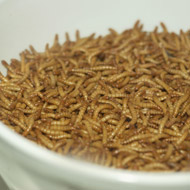
Hazards depend on production methods
An initial risk assessment of using insects as a source of protein for human and animal consumption has been carried out by the European Food Safety Authority (EFSA).
EFSA's scientific experts concluded that risks to animal and human health depended on how the insects were raised and processed.
A number of organisations, including the United Nations, suggest that eating insects could help fight world hunger, improve nutrition and reduce pollution. However, the UN admits that "consumer disgust" remains a large barrier in many western countries.
The report, requested by the European Commission, assessed "potential biological and chemical hazards, as well as allergenicity and environmental hazards associated with the use of farmed insects used in food and feed." It took into account the entire chain, from farming to the final product.
The report concluded that for biological and chemical hazards of using farmed insects for consumption by humans and animals, it depends on what production methods are used.
It states: "The specific production methods, the substrate used, the stage of harvest, the insect species, as well as the methods used for further processing will all have an impact on the possible presence of biological and chemical contaminants in insect food and feed products."
The report also assessed the environmental risk of insect farming, concluding that it is expected to be comparable to other animal production system.
It said that existing waste management strategies should be applicable for disposing of waste from insect production.
EFSA scientific officer Tilemachos Goumperis told BBC News that the initial assessment focused on identifying potential risks and hazards posed by insect farming and did not consider the issue of food and nutrition security.
He added that the working group identified a number of gaps in available data in a number of areas, such as human consumption, animal and pet consumption, viruses and allergens.
The report recommends further research "for better assessment of microbiological ad chemical risks from insects as food and feed, including studies on the occurrence of hazards when using particular substrates, like food waste and manure."
Image (C) Pengo/Wikimedia



 HMRC has invited feedback to its communications regarding the employment status of locum vets and vet nurses.
HMRC has invited feedback to its communications regarding the employment status of locum vets and vet nurses.